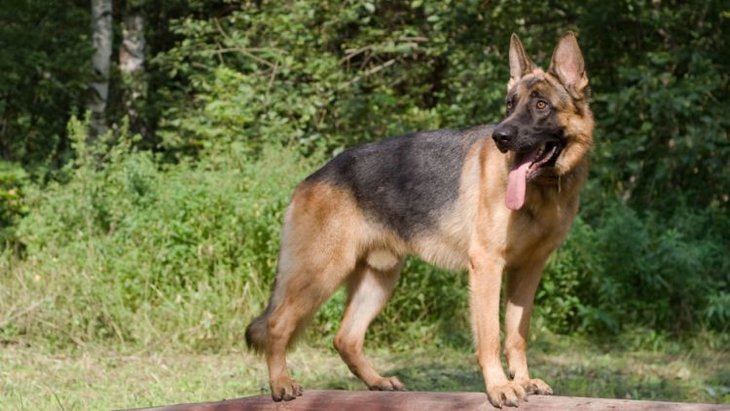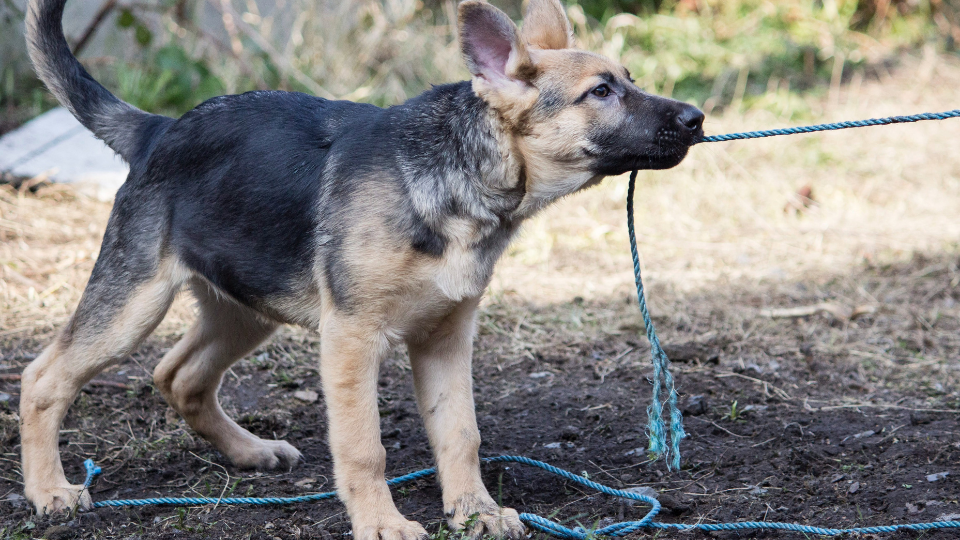German Shepherd Growth & Weight Chart: Everything You Need To Know
Cornell University College of Veterinary Medicine
German Shepherd dogs (GSDs) are smart, energetic, and task-driven, which is why they're known for being one of the best dog breeds for police and military work. It should also come as no surprise that adult German Shepherds can get really big!
Your new puppy may be small — but their vet bills won't be.
Save big on costs with pet insurance, so you can protect your puppy while protecting your wallet.
The question is: just how big can a German Shepherd get, and how do you know when they have stopped growing?
Here's everything you need to know about German Shepherd growth rate:
- Male German Shepherd Growth & Weight Chart
- Female German Shepherd Growth & Weight Chart
- When do German Shepherds stop growing?
- How much bigger will my German Shepherd get?
- What is the size of a full-grown German Shepherd?
- How do I make sure my German Shepherd is healthy?
German Shepherd Growth & Weight Chart
These numbers are estimates to give you an idea of how much a German Shepherd weighs month by month. Don’t worry if your puppy is slightly behind or ahead; just be sure to take your pet to regular vet appointments to ensure they are healthy and happy!
Male German Shepherd Growth Chart
| Age | Height | Weight |
|---|---|---|
| 1 month | 4 - 6” | 5.5 - 9 lbs |
| 2 months | 7 - 9” | 16 - 20 lbs |
| 3 months | 9 - 11” | 22 - 30 lbs |
| 4 months | 11 - 14” | 35 - 40 lbs |
| 5 months | 14 - 16” | 40 - 49 lbs |
| 6 months | 16 - 18” | 49 - 57 lbs |
| 7 months | 19 - 20” | 57 - 62 lbs |
| 8 months | 20 - 22” | 62 - 66 lbs |
| 9 months | 21 - 23” | 64 - 71 lbs |
| 10 months | 22 - 24” | 66 - 73 lbs |
| 11 months | 22 - 24” | 71 - 75 lbs |
| 1 year | 22 - 24” | 71 - 79 lbs |
| 1.5 years | 23 - 25” | 71 - 79 lbs |
| 2 years | 23 - 23” | 71 - 84 lbs |
| 3 years | 24 - 26” | 79 - 88 lbs |
Female German Shepherd Growth Chart
| Age | Height | Weight |
|---|---|---|
| 1 month | 3 - 6” | 4.5 - 8 lbs |
| 2 months | 6 - 9” | 11 - 17 lbs |
| 3 months | 8 - 10” | 17 - 26 lbs |
| 4 months | 10 - 12” | 31 - 35 lbs |
| 5 months | 12 - 14” | 35 - 44 lbs |
| 6 months | 15 - 17” | 44 - 49 lbs |
| 7 months | 17 - 19” | 49 - 53 lbs |
| 8 months | 18 - 20” | 53 - 57 lbs |
| 9 months | 19 - 21” | 55 - 60 lbs |
| 10 months | 19 - 21” | 57 - 62 lbs |
| 11 months | 20 - 22” | 60 - 64 lbs |
| 1 year | 20 - 22” | 60 - 64 lbs |
| 1.5 years old | 21 - 22” | 60 - 66 lbs |
| 2 years | 21 - 22” | 60 - 66 lbs |
| 3 years | 22 - 24” | 66 - 70 lbs |
Click the button below to download your own German Shepherd growth chart that you can fill out at home to track your puppy's progress.
When do German Shepherds stop growing?
Like many large breeds, a German Shepherd dog is not considered fully grown until they are about 18 months old. Female German Shepherds continue to fill out until they are around two years old, while the male German Shepherd growth rate continues until they reach two and a half years of age. Males are larger and require more time to fill out their chest and abdomen.
As you can see by the German Shepherd weight chart, these dogs can continue to grow until they are three years old, but the majority of growth occurs within 24 months. If your GSD is older than 36 months and continues to put on weight, contact your veterinarian to ensure weight gain does not lead to obesity.

How big should a 6-month-old German Shepherd be?
A six-month-old German Shepherd puppy will be quite large, as many German Shepherds undergo massive growth spurts between two and five months old. By six months, a male German Shepherd will weigh 53 pounds on average, whereas a female will weigh about 46 pounds.
How much bigger will my German Shepherd get?
There are a few ways to gauge how much bigger a German Shepherd will get.
First, check your puppy's age. If your GSD is younger than two years old, they definitely have room to keep growing!
Another way to tell if your pup still has a lot of growing to do is their paw size. Do their paws look large compared to their legs and body? This is a classic adolescent feature of a dog and means your pup is likely still growing!
If you bought your German Shepherd from a breeder, they should be able to give you a specific, estimated weight based on your puppy’s parents and past litter. Most of the time, a dog will not grow bigger than its larger parents.

What is the size of a full-grown German shepherd?
An adult male German Shepherd is typically 24 to 26 inches tall, while adult female German Shepherds are 22 to 24 inches tall, according to the American Kennel Club German Shepherd Standard.
The estimated full-size varies significantly between sexes. In terms of weight, an adult male German Shepherd weighs anywhere from 75 to 90 pounds. A female German Shepherd weighs notably less at 55 to 70 pounds.
Please keep in mind that these numbers are only estimates to give you an idea of how much bigger a German Shepherd puppy may get. Some dogs will be both smaller and larger than these weight ranges when fully grown due to a variety of genetic and environmental factors.
Learn all about your puppy's physical characteristics, breed history, personality traits, and more in our comprehensive guide.
How do I make sure my German Shepherd is healthy?
Preventive care is key in helping your German Shepherd live a healthy and long life. It’s vital that your German Shepherd eats a well-rounded diet and receives enough exercise. Helping your dog maintain an optimal weight is one of the best things you can do for their health.
The American Veterinary Medical Association estimates that extra weight can decrease your pet’s overall life expectancy by more than two years. Speak with your vet about your German Shepherd’s ideal weight and any lifestyle changes, like additional exercise, specific diets, treats, or food quantity you can make to encourage a healthy life for your German Shepherd.
Taking your German Shepherd to regular veterinary appointments is one of the best things you can do to ensure that they are healthy and feeling their best. An experienced veterinarian can assess your pet’s health, make general health and wellness recommendations, and look out for common, breed-specific conditions.Pro Tip: Want to get reimbursed for up to 100% of future veterinary bills that your GSD may experience? Compare German Shepherd health insurance plans before they get sick or injured.
German Shepherds are particularly prone to a condition called gastric dilatation-volvulus or “"bloat” due to their large size, deep chests, and high energy level. They are also more susceptible to gastrointestinal tract and hip issues. A veterinarian should regularly assess your pet for these health problems and run tests for anything they may be more prone to due to their breed.
Regular vet visits are crucial to your pet’s ongoing health and longevity. It’s also essential to plan for the cost of accidents or illnesses. Treatment for many conditions, including bloat and GI issues, can cost thousands of dollars.
Dog insurance is a wise investment that can give you peace of mind by covering pet emergency expenses. Wellness plans are also available to help cover the cost of vaccinations, vet exams, microchips, and more.
Some people can predict the future.For everyone else, there's pet insurance.
Do you want to find the best pet insurance?
Let's analyze your pet's breed, age, and location to find the right coverage and the best savings. Ready?
Analyze My PetAbout Pawlicy Advisor
The pet insurance marketplace endorsed by veterinarians, at Pawlicy Advisor we make buying the best pet insurance easier. By comparing personalized coverage and pricing differences we can save you a ton of money, up to 83% in some instances!
Instantly Compare Pet Insurance Plans
Guides
Determine If Pet Insurance Is Worth It
Comparison Charts
Find Your State
Dog Insurance
Cornell University College of Veterinary Medicine
Aliyah Diamond has more than ten years of experience in animal hospitals - working with dozens of species from dogs and cats, to elephants and snow leopards. Her lifelong passion for helping animals currently has her earning her doctorate of veterinary medicine at Cornell University and helping Pawlicy Advisor educate pet parents.
